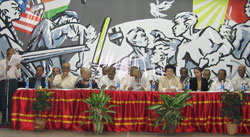Anti-imperialist meeting stresses solidarity
By
Special to Workers World
Kolkata, India
Published Dec 9, 2005 11:35 PM
On the second
anniversary of the U.S. attack on Iraq, anti-imperialist groups in India last
March mobilized a million people to form a human chain across Bengal, from the
hills of Darjeeling to the coastal inlets of the Sunderbans.
|
Heather Cottin, fifth from left, at anti-imperialist
conference in India.
|
On Nov. 24,
one of the organizations involved, the All-India Anti-Imperialist Forum (AIAIF),
held an international conference in Kolkata that stressed global cooperation in
building “militant movements for peace and against imperialist oppression
and aggression in all corners of the globe” in order to “thwart the
sinister designs of the imperialists.”
The AIAIF conference
unanimously hailed the valiant struggle of the Iraqi people against the
occupation of Iraq and upheld the fight of the Nepalese people against an
autocratic, imperialist-backed king. Delegates saluted the resistance of peoples
of Latin America, demanding that the U.S. end its economic blockade and all
aggressive maneuvers against Cuba. Resolutions condemned the butchery of the
Palestinian people by U.S.-supported Zionist Israel. Resolutions also condemned
the imperialist powers’ exploitation of Africa.
The General
Secretary of the AIAIF, Dr. Sushil Kumar Mukherjee, opened the conference with a
review of the struggle against imperialism since his group’s founding in
1995. “During these 10 years the world has seen the rampant and inhuman
demolition of civil and moral rights.... [I]mperialism has spread ... throughout
the world using newer, more destructive weapons.”
Delegates came
from anti-imperialist groups in many countries, including the International
Action Center in the U.S. In a videotape made for the event, former U.S.
Attorney General Ramsey Clark, founder of the IAC, told the conference,
“Peoples of the world need to work together to overcome the concentrated
power of wealth.... The imperative need is that we study hard, analyze
carefully, reach out to each other to organize, to plan, to work to bring peace
to earth.”
The IAC, which has had solidarity relations with the
AIAIF since 1995, was represented at this event by Heather Cottin, who was
invited to make a 13-day speaking tour that encompassed Delhi, Bangalore,
Mysore, Siliguri, Thiruvan an thapuram (Kerala) and the international conference
in Kolkata.
Cottin told the conference that, “Because of the
resistance of the Iraqi people, the world’s people see that the U.S.,
while capable of inflicting horrible wounds, is incapable of defeating a people
in resistance. This has given heart and strength to ... Syria and Iran as well
as Cuba and Bolivarian Venezuela.”
North of India is Nepal, an
impoverished country of 28 million people where a united left front is
struggling against King Gyanendra, an absolute monarch supported by the U.S. and
Britain. Sunil Manandhar, president of the Nepal Progressive Trade Union
Federation (NPTUF), pointed out that in his country “an undeclared
military autocratic dictatorship is reigning, pushing the nation to the verge of
civil war.” Manandhar said that for the “working class movement
there is nothing more urgent and more important than to internationalize the
anti-imperialist struggle.”
East of India lies another deeply
oppressed country: Bangladesh, with 144 million people. Khalekuzzaman, the
convener of the Socialist Party of Bangladesh, told the conference that in his
country, the “U.S. and India, with the collaboration of our ruling class,
are plundering our natural resources, including oil, gas and coal. They are
destroying our industries and agriculture. The U.S. is eying our main seaport,
which is the lifeline of our economy. This is threatening peace and stability in
our region.”
Khalekuzzaman commended “the heroic resistance
war of the Iraqi masses, Palestinian people, and DPRK, Cuba, Venezuela and Syria
at the forefront of the struggle against U.S. hegemonism.”
Other
international speakers included Nina Andreyeva of Russia’s All-Union
Communist Party of Bolsheviks, who contrasted socialist international
cooperation with imperialist globalization that “sharply increases
inequality and destroys the environment,” and Nisha, a delegate from
Turkey and North Kurdistan’s Marxist-Leninist Communist Party, who called
for the formation of “institutions that would provide regional
co-ordination ... to combine anti-imperialist struggle with the fight against
capitalism.”
India is one of the major countries providing cheap
labor and resources for imperialism. From Starbuck’s Tazo tea to tomatoes
for Heinz ketchup, from information technology for BankAmerica to hand-crafted
textiles, the U.S. is India’s number-one trading partner, and the ravages
of imperialism are visible everywhere.
Although two of India’s
states—West Bengal and Tripura—are led by left fronts that include
parliamentary-oriented communist parties, which also command huge votes in
several other states, even there the rapid spread of privatization and
globalization has enmeshed Indian workers in the web of imperialism. Some 65
percent of India’s population lives below the poverty level while
commercialism is spreading among the middle class.
Nevertheless, at press
conferences and meetings where Heather Cottin spoke on her tour, amazement was
frequently expressed at how the victims of Hurricane Katrina were left to suffer
and die in the richest country in the world.
AIAIF members were keen to
maintain an on-going relationship with the International Action Center to
coordinate anti-imperialist activities with comrades in the United States.
Cottin explained the significance for the U.S. anti-war movement of the unity
between Black, Latin@, Native American, lesbian/gay/bi/trans and international
activists in the Troops Out Now Coalition, of which the IAC is a part.
Articles copyright 1995-2012 Workers World.
Verbatim copying and distribution of this entire article is permitted in any medium without royalty provided this notice is preserved.
Workers World, 55 W. 17 St., NY, NY 10011
Email:
[email protected]
Subscribe
[email protected]
Support independent news
DONATE


